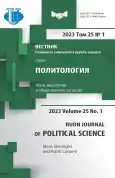‘Property of the Nation’ - Resource Nationalism to Become a Political Doctrine in Contemporary Mongolia?
- 作者: Mikhalev A.V.1
-
隶属关系:
- Buryat State University
- 期: 卷 25, 编号 1 (2023): Ideas, Ideologies and Public Consent
- 页面: 218-232
- 栏目: IDEAS AND IDEOLOGIES IN THE INTERNATIONAL CONTEXT
- URL: https://journal-vniispk.ru/2313-1438/article/view/322254
- DOI: https://doi.org/10.22363/2313-1438-2023-25-1-218-232
- ID: 322254
如何引用文章
全文:
详细
The proposed paper is a study of resource nationalism. Resource nationalism appeared in Mongolia in the post-Socialist period. In this paper, we understand resource nationalism as a wide spectrum of strategies domestic elites employ in order to increase their control of natural resources - definition by Paul Domjan and Matt Stone. After an analysis of legal materials, mass media articles and political rhetoric, the author of this paper concludes that the sources of resource nationalism should be searched in the texts that date back to the Socialist era. Also, the sources of resource nationalism can be found in the ideas about justice of those times. The idea that natural resources belong to the people has been fixed in mass opinion, while contemporary nationalists justify this idea from the standpoint of “blood and soil”. That creates serious problems for Mongolia, a country with resource economy. The matter is that economic growth driven with foreign investments has caused a deep social stratification. In its turn, social stratification gave birth to a social demand for fair profit distribution from natural resource extraction. In the political sphere, this social demand quickly received a reaction - in the form of resource nationalism rhetoric. In the paper, we notice that resource nationalism in Mongolia has not been formed as a vivid legal or political doctrine. Today, it is a set of populist rhetoric of current interest which are used both for lobbying future political decisions in mining and for legitimizing the decisions already made.
作者简介
Alexey Mikhalev
Buryat State University
编辑信件的主要联系方式.
Email: mihalew80@mail.ru
ORCID iD: 0000-0001-7069-2338
Doctor of Political Sciences, Director of the Centre for Political Transformations Studies
Ulan-Ude, Russian Federation参考
- Amarsanaa, J. (2009). Constitutionalism and Constitutional review in Mongolia. Ulaanbaatar: National Legal Institute Press.
- Bashkuev, V.U. (2012). «Resource Boom» and Modern Challenges to Mongolia’s Development Strategies (Based on Western Scientific Periodicals and Mass Media). Cultural heritage of the peoples of Central Asia (Issue 3, pp. 50–60). Ulan-Ude: BSC SB RAS Publishing House. (In Russian).
- Bulag, U.E. (2009). Mongolia in 2008: From Mongolia to Mine-golia. Asian survey, 49(1), 129–134.
- Bumochir, D. (2020). The State, Popular Mobilisation and Gold Mining in Mongolia. Shaping ‘Neoliberal’ Policies. London: UCLPress.
- Buraev, D.I., & Rodionov, V.A. (2017). Mongolia Presidential Election 2017: Foreign Policy Aspects. Far Eastern Affair, (5), 26–31. (In Russian).
- Delaplace, G. (2012). Neighbors and their Ruins: Remembering Foreign Presences in Mongolia. Frontier Encounters: Knowledge and Practice at the Russian, Chinese and Mongolian Border, pp. 211–234. London: Open book publishers.
- Domjan, P., & Stone, M. (2010). A Comparative Study of Resource Nationalism in Russia and Kazakhstan 2004–2008. Europe-Asia Studies, 1(62), 35–62.
- Ganbold, M., & Ali, S.H. (2017). The peril and promise of resource nationalism: A case analysis of Mongolia’s mining development. Resources Policy, (1), 1–11.
- Enkhtuvshin, B., Kuras, L.V., & Tsibenov, B.D. (2013). Globalization and Traditional Cattle Breeding of Mongolian Nomads. Humanitarian Vector, (4), 235–243. (In Russian).
- Humphrey, C., & Sneath, D.A. (1999). The End of Nomadism? Society, State, and the Environment in Inner Asia. Durham: Duke University Press.
- Jackson, S.L. (2015). Imagining the mineral nation: Contested nation-building in Mongolia. Nationalities Papers, 43(3), 437–456.
- Lander, J. (2013). A Critical Reflection on Oyu Tolgoi and the Risk of a Resourse Trap in Mongolia: Troubling the “Resource Nationalism” Frame. The Journal of Law, Social Justice and Global Development, (2), 1–14.
- Mikhalev, A.V. (2014). The daily routine of economic nationalism, or who owns Mongolia’s gold? Journal of Sociology and Social Anthropology, 5(17), 177–191. (In Russian).
- Mikhalev, A.V., & Rakhimov, K.K. (2023). Central Asia and the Struggle for the Soviet Legacy // Russia in Global Affairs, 1(119), 153–162. (In Russian).
- Mydar, O., & Jackson, S.L. (2019). Contradictions of Populism and Resource Extraction: Examining the Intersection of Resource Nationalism and Accumulation by Dispossession in Mongolia. Annals of the American Association of Geographers, (2), 361–370.
- Pedersen, M.A. (2011). Not Quite Shamans: Spirit Worlds and Political Lives in Northern Mongolia (Culture and Society after Socialism). Ithaca and London: Cornell University Press.
- Pieper, M. (2021). The new silk road heads north: implications of the China-Mongolia-Russia economic corridor for Mongolian agency within Eurasian power shifts. Eurasian Geography and Economic. 62(5–6), 745–768.
- Pomfret, R. (2011). Resource Management and Transition in Central Asia. Azerbaijan and Mongolia. East-West Center Working Paper. Economics series, 118 (June), 3–33.
- Sanders, A.J. (1968). The People’s Republic of Mongolia: A general reference guide, New York: Oxford U.P.
- Smith, S. (2020). Power of the People’s Parties and a post-Soviet Parliament: Regional infrastructural, economic, and ethnic networks of power in contemporary Mongolia. Journal of Eurasian Studies, (2), 107–116.
- Szmyt, Z. (2012). History of nation and ethnicity in Mongolia. Sensus Historiae. Studia interdyscyplinarne, 3(VIII), 11–28.
- Waters, H. (2022). Building Merit: The Moral Economy of Illegal Wildlife Trade in Rural PostSocialist Eastern Mongolia. Comparative studies in Society and History, 64(2), 422–445.
补充文件









